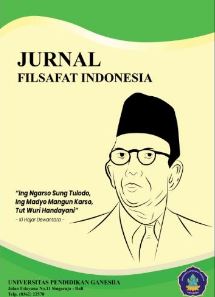The Energy in the Perspective of Chinese Philosophy
DOI:
https://doi.org/10.23887/jfi.v6i3.54081Keywords:
law of energy conservation, taoist philosophy, yin-yang philosophyAbstract
This article is presented with library research. Literature studies were conducted on books, scientific articles, and references relevant to the concept of energy from a philosophical perspective. Then it is synthesized systematically and in-depth to provide information in the form of meaningful and useful research results. So the results of a literature review on energy from a philosophical perspective are: 1) The universe is composed of particles and energy; 2) All living things on this earth need energy; 3) The human mind is a magnet for generating energy; 4) Energy in humans is divided into two, namely positive and negative energy; 5) The selection of energy that is channeled will determine who the individual is. So it can be said that humans with reason and knowledge have full power over themselves to manage these two potentials.
References
Adib, M. (2018). Filsafat Ilmu: Ontologi, Epistemologi, dan Logika Ilmu Pengetahuan. Pustaka
Pelajar.
Amin, F. (2014). Posbakum Antara Teori dan Praktek. Tidak dipublish. Pontianak: IAIN Pontianak
Press
Amiruddin M. A. (2020) "Refleksi Energi Positif dan Negatif". Diakses pada tanggal:11/11/2022
Anugrah, M. N., & Radiana, U. (2022). Filsafat Rasionalisme Sebagai Dasar Ilmu Pengetahuan.
Jurnal Filsafat Indonesia, 5(3), 182-187.
Antika, R. (2015). Menjadi Wanita yang Dapat Mengubah Energi Negatif ke Positif pada
Pasangan. DIVA PRESS.
Asmal S. (2021). Membangun Energi Positif dalam Diri. Pada link:
https://www.pasbana.com/2021/08/membangun-energi-positif-dalam-diri.html.
Aulia S. (2022). Teori Pengetahuan dan Kebenaran dalam Epistemologi. Jurnal Filsafat
Indonesia, 5 (3), 242-249.
Barata, B. (2016). Penggunaan Metode Eksperimen untuk Meningkatkan Kemampuan
Memahami Hukum Kekekalan Energi Mekanik pada Siswa Kelas II Semester I SMA Negeri
Bendungan Kabupaten Trenggalek Tahun Ajaran 2010/2011. Jurnal Inspirasi
Pendidikan, 6(1), 792-801.
Bergmann, L. & Schaefer, C. (1998). Lehrbuch der Experimentalphysik (Vol. I. 11thed.). de
Gruyter.
Coelho, R. L. (2009). On the Concept of Energy: History and Philosophy for Science Teaching.
Procedia-Social and Behavioral Sciences, 1(1), 2648-2652.
Firman,H. (2019a). Pengantar Filsafat Ilmu Pengetahuan Alam. Buku tidak dipublish. Sekolah
Pascasarjana Universitas Pendidikan Indonesia.
________ (2019b). Kepastian dan ketidakpastian dalam sains. Jurnal Filsafat Indonesia, 2 (1),
-36.
French, S., & McKenzie, K. (2016). Rethinking Outside the Toolbox: Reflecting Again on The
Relationship Between Philosophy of Science and Metaphysics. Poznan Studies in the
Philosophy of the Sciences and the Humanities, 104(3), 25–54.
Geerts, R. J., Gremmen, B., Jacobs, J., & Ruivenkamp, G. (2014). Towards a Philosophy of
Energy. Scientiae Studia, 12, 105-127.
Gunarwan N. (2022). Apa Itu Energi Positif dan Energi Negatif?.
Hamdani. (2011). Filsafat Sains. Pustaka setia.
Idaman. (2019). Relasi Kuasa-Pengetahuan dalam Sistem Ketatanegaraan di Kerajaan Konawe
Abad ke-XVII: Telaah Epistemologi Siwole Mbatohu. Halu Oleo Law Review, 132-156.
Idris, M., Adam, R. I., Brianorman, Y., Munir, R., & Mahayana, D. (2022). Kebenaran dalam
Perspektif Filsafat Ilmu Pengetahuan dan Implementasi dalam Data Science dan Machine
Learning. Jurnal Filsafat Indonesia, 5(2), 173-181.
Ishak Muh. (2020). Tausiyah Ramadhan; Mengelola Energi Positif.
https://www.iainpare.ac.id/tausyiah-ramadhan-mengelola-energi-positif/.
Istiqomah, R. I. A., & Wachid, A. (2021). Filsafat sebagai Landasan Ilmu dalam Pengembangan
Sains. Jurnal Filsafat Indonesia, 4(1), 59-64.
Nurmala, M., Iryanti, M., & Imansyah, H. (2022). Prototipe Kincir Air Sebagai Media Pembelajaran
Hukum Kekekalan Energi. In Prosiding Seminar Nasional Fisika (Vol. 1, No. 1, pp. 209-
.
Nugroho, A. (2022). Waste Bank Concept: Having Savings and Income From Waste. Akademik:
Jurnal Mahasiswa Humanis, 2(2), 46-54.
Persamaan Kekekalan Energi. Jurnal Teknik Sipil ITB, 16(1), 39-48.
_________ (2010). Pemodelan Dinamika Gelombang dengan Mengerjakan Persamaan
Kekekalan Energi. Jurnal Teknik Sipil ITB, 14(1), 59-68
Pitoyo, J. (2006). Manusia Bijaksana Menurut Taoisme. Jurnal Filsafat, 16(3), 250-276.
Putawa, R. A. (2022). Makna Filosofis Ketiadaan dan Relevansinya dengan Tipe Data Undefined
pada Javascript. Jurnal Filsafat Indonesia, 5(1), 80-86.
Pramono, M. (2005). Filsafat Seni Taoisme. dalam Jurnal Prasasti, 15(58), 1-17.
Reid, D. (1989). The Tao of Health, Sex, and Longevity: A Modern Practical Guide to the Ancient
Way. Simon and Schuster.
Schipper, K. (1993). The Taoist Body. Univ of California Press.
Subekti, I., Syukri, A., Badarussyamsi, B., & Rizki, A. F. (2021). Kontribusi Filsafat Ilmu dalam
Penelitian Ilmiah dan Kehidupan Sosial. Jurnal Filsafat Indonesia, 4 (3), 229-241.
Sumaningsih, N. M. A. (2019). Meningkatkan Kemampuan Menerapkan Hukum Kekekalan
Energi dengan Menggunakan Media Gayus di Kelas VIII. 6 SMP Negeri 1 Tanjung. Jurnal
Kependidikan: Jurnal Hasil Penelitian dan Kajian Kepustakaan di Bidang Pendidikan,
Pengajaran dan Pembelajaran, 5(1), 40-46.
Suntana, I. (2018). Keabadian Air: Telaah Teologi Energi dalam Islam dan Hukum
Termodinamika. Afkaruna: Indonesian Interdisciplinary Journal of Islamic Studies, 14 (2),
-261.
Tse, L. (2011). Tao te ching. Mauad Editora Ltda
Widiana, I. W. (2019). Filsafat Cina: Lao Tse Yin-Yang Kaitannya dengan Tri Hita Karana Sebagai
Sebuah Pandangan Alternatif Manusia Terhadap Pendidikan Alam. Jurnal Filsafat
Indonesia, 2(3), 110-123.
Widiantari. (2012). Model Pembelajaran Konvensional. Pustaka Setia.
Downloads
Published
Issue
Section
License
Copyright (c) 2023 Jurnal Filsafat Indonesia

This work is licensed under a Creative Commons Attribution-ShareAlike 4.0 International License.

Jurnal Filsafat Indonesia Undiksha is licensed under a Creative Commons Attribution-ShareAlike 4.0 International License.




